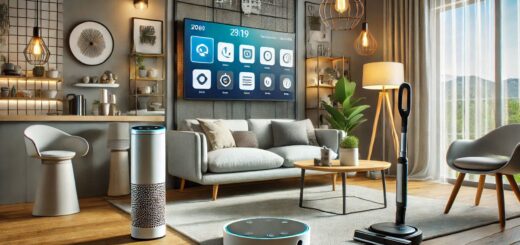Top 10 Home Security Systems to Protect Your Family and Property
When it comes to protecting your home, family, and valuables, a reliable home security system is essential. Whether you live in a bustling city or a quiet suburb, the peace of mind that comes with knowing your property is secure is invaluable. With technology advancing rapidly, home security systems today offer an array of features, including smart home integration, motion detection, video surveillance, and remote access, ensuring a more robust defense against burglars, fires, and even medical emergencies.
In this article, we will explore the top 10 home security systems available, each offering a unique blend of features tailored to meet different needs and preferences. These systems will provide you with a range of options to protect your home, family, and assets.
Table of Contents
What Are Home Security Systems?
A home security system refers to a network of interconnected devices designed to protect a home from potential threats such as burglaries, fires, or medical emergencies. These systems typically include a combination of alarms, cameras, sensors, and other devices that work together to alert homeowners or monitoring centers about any suspicious activity. Modern security systems also offer features like remote monitoring, smart home integration, and video surveillance, making it easier than ever to keep track of your home’s security.
The primary goal of a home security system is to deter crime, protect family members, and minimize damage to property. Whether you want to monitor your home when you’re away, or simply add an extra layer of protection, home security systems offer a variety of options to suit different needs.
Main Features to Look for in Home Security Systems
When choosing a home security system, it’s important to consider the features that will best meet your needs. Here are some key features to look for:
1. 24/7 Monitoring
Most security systems offer 24/7 monitoring services, meaning that a professional monitoring center will keep an eye on your property around the clock. If an alarm is triggered, the monitoring center will notify emergency responders, giving you peace of mind that someone is always watching over your home.
2. Motion Detection
Motion sensors are a crucial component of many home security systems. These sensors can detect movement in specific areas of your home and trigger alarms if anything suspicious is detected. Motion detectors are typically used to protect entry points, such as doors and windows, but can also be placed in hallways or rooms inside the house.
3. Video Surveillance
Video cameras allow you to monitor both the interior and exterior of your property. Many systems offer high-definition cameras with night vision, ensuring clear visibility in low-light conditions. Some systems also offer two-way audio, so you can communicate with anyone at your door or within your home.
4. Smart Home Integration
Smart home integration allows your security system to work with other devices, such as lights, thermostats, and locks. This integration provides added convenience and control, as you can use your smartphone or voice commands to manage your security system, even when you’re not home.
5. Mobile App Access
Mobile app access allows you to monitor and control your security system remotely. Through the app, you can arm and disarm your system, view live video footage, and receive notifications if anything unusual occurs. This is especially useful if you travel frequently or want to check in on your home while you’re away.
Take a Look at the Top 10 Home Security Systems
Now that you know what features to look for and how to choose the best security system, let’s explore the top 10 home security systems currently available. These systems offer a range of features to suit different needs, from budget-friendly DIY setups to advanced, professionally installed systems.
1. ADT Home Security: A Trusted Name in Security

Overview of ADT Home Security System
ADT has been a leading name in the home security industry for over 140 years. Known for its reliable, high-quality services and advanced technology, ADT offers both wired and wireless systems that can be customized based on your needs. Their systems are scalable and are suitable for both small homes and large estates.
Key Features of ADT Home Security
- 24/7 Professional Monitoring: ADT provides round-the-clock monitoring services, ensuring that emergency responders are contacted instantly in case of a break-in or other incidents.
- Smart Home Integration: ADT integrates with popular smart home platforms, allowing you to control lights, locks, and thermostats from your mobile device.
- Video Surveillance: ADT offers high-definition video cameras that allow you to monitor both the interior and exterior of your property.
- Mobile App Access: The ADT Pulse app provides you with remote access to your system, enabling you to arm and disarm the system, view camera footage, and more.
Pros and Cons
- Pros: Trusted brand with years of experience, wide range of features, professional installation, mobile app control.
- Cons: Higher price point, installation fees.
2. Ring Alarm: Best for Smart Home Integration

Overview of Ring Alarm System
Ring, widely known for its video doorbells, offers a comprehensive home security system that is easy to install and manage. Ring’s security packages include a base station, motion detectors, contact sensors, and cameras, all integrated with the Ring app for complete control.
Key Features of Ring Alarm
- Affordable Pricing: Ring offers one of the most budget-friendly options, with affordable monthly monitoring plans.
- Integration with Ring Video Doorbells: If you already own a Ring video doorbell, integrating it with your Ring Alarm system is seamless.
- DIY Installation: The system is easy to install without the need for professional help, making it a good choice for renters or homeowners who prefer a flexible setup.
- Smart Alerts and Notifications: Receive instant notifications when any sensor is triggered.
Pros and Cons
- Pros: Affordable, easy installation, mobile app control, smart home integration.
- Cons: Limited advanced features compared to some other systems, reliance on Wi-Fi.
3. SimpliSafe: The Best for Customization and Flexibility

Overview of SimpliSafe Home Security System
SimpliSafe is a popular DIY home security system known for its simplicity and flexibility. The system offers customizable equipment bundles, so you only pay for what you need. With no long-term contracts or professional installation, SimpliSafe is an attractive option for those who want control over their home security.
Key Features of SimpliSafe
- DIY Setup: SimpliSafe allows for easy self-installation with no need for professional installation or extra fees.
- Customizable Packages: Choose the components you need (motion sensors, door/window sensors, cameras, etc.) to build your perfect security setup.
- 24/7 Professional Monitoring: You can choose to have 24/7 professional monitoring or opt for self-monitoring, depending on your budget and needs.
- Wireless Design: The system is completely wireless, making it ideal for renters or people who move frequently.
Pros and Cons
- Pros: No contract, affordable, easy setup, customizable.
- Cons: Fewer advanced features compared to larger systems, reliance on Wi-Fi for certain functions.
4. Frontpoint: Best for Mobile Control

Overview of Frontpoint Home Security System
Frontpoint is another DIY home security system that stands out for its mobile accessibility. With a range of sensors, cameras, and smart home integration options, Frontpoint is ideal for homeowners looking for flexibility and ease of use.
Key Features of Frontpoint
- Mobile App Control: The Frontpoint mobile app allows you to control and monitor your system from anywhere.
- Smart Home Integration: The system integrates with Amazon Alexa and Google Assistant, enabling voice control of various security features.
- High-Quality Video Surveillance: Frontpoint offers HD cameras with motion detection and two-way audio, allowing you to see and communicate with anyone at your front door or inside your home.
- Fast Response Times: Frontpoint’s professional monitoring services boast fast response times in case of emergencies.
Pros and Cons
- Pros: Easy setup, great mobile app, professional monitoring, no long-term contracts.
- Cons: Relatively higher price point, equipment costs may add up.
5. Vivint: The Best for Smart Home Enthusiasts

Overview of Vivint Home Security System
Vivint is a premium security system that specializes in smart home integration. Their professionally installed systems offer a range of advanced features, including high-definition cameras, smart locks, and home automation. Vivint’s systems are ideal for tech-savvy users looking for an all-in-one solution for their home.
Key Features of Vivint
- Smart Home Integration: Vivint offers the most robust smart home features, including integration with Google Assistant and Amazon Alexa, allowing for voice control of your home.
- Professional Installation: Vivint’s systems are professionally installed to ensure optimal configuration.
- HD Video Cameras: Vivint’s cameras provide high-definition video with night vision, so you can monitor your property 24/7.
- Mobile App: The Vivint Smart Home app allows you to control and monitor your security system remotely.
Pros and Cons
- Pros: Comprehensive smart home integration, professional installation, high-quality cameras, advanced automation options.
- Cons: Expensive, requires professional installation, long-term contracts.
6. Cove: The Best for Easy DIY Setup and Affordable Monitoring

Overview of Cove Home Security System
Cove is another DIY home security system that provides a simple and affordable solution for home protection. It offers a straightforward setup with flexible monitoring options, including a month-to-month plan for those who don’t want to commit to a long-term contract.
Key Features of Cove
- DIY Installation: Cove’s system is simple to install, requiring no tools or professional help.
- Affordable Monitoring Plans: The company offers affordable monitoring plans with no long-term contract required.
- Customizable Packages: Choose the right sensors, cameras, and detectors for your home.
- Mobile App: Cove’s app allows you to manage your system and receive alerts on your phone.
Pros and Cons
- Pros: Low cost, easy setup, no long-term contracts, flexible monitoring options.
- Cons: Limited smart home features, fewer equipment options compared to larger companies.
7. Protect America: Best for Budget-Friendly Plans

Overview of Protect America Home Security System
Protect America offers a highly affordable home security system with a range of equipment options and monitoring plans. They cater to budget-conscious homeowners while still providing reliable protection.
Key Features of Protect America
- Low-Cost Monitoring: Protect America provides some of the most affordable monitoring plans in the industry.
- Wide Range of Equipment: Choose from a variety of sensors, cameras, and smart home devices to tailor your security setup.
- 24/7 Professional Monitoring: The system includes professional monitoring services at a low monthly rate.
- Wireless System: The system is fully wireless and easy to install.
Pros and Cons
- Pros: Affordable, flexible plans, wide selection of equipment.
- Cons: Installation fees, limited advanced features.
8. Abode: The Best for Flexibility and Scalability

Overview of Abode Home Security System
Abode is an excellent option for those who want a flexible, scalable, DIY home security system. The system offers both basic and advanced options, allowing you to upgrade your system as your needs change.
Key Features of Abode
- Scalable: Add additional devices and sensors as needed to expand your system.
- Mobile App Control: The Abode mobile app provides remote access to your system, allowing you to monitor activity and control features from anywhere.
- No Contract: Abode offers a no-contract monitoring plan, making it a great option for renters or anyone who prefers flexibility.
- Smart Home Integration: Integrates with Alexa, Google Assistant, and Zigbee, offering greater control and automation.
Pros and Cons
- Pros: Scalable, flexible, no contract, smart home integration.
- Cons: Higher equipment cost, fewer professional monitoring features.
9. Nest Secure: Best for Google Users

Overview of Nest Secure Home Security System
Nest Secure is Google’s home security system, and it integrates seamlessly with Google Home devices. If you already use Google products in your home, Nest Secure offers a cohesive and user-friendly security solution.
Key Features of Nest Secure
- Google Integration: Full integration with Google Assistant, allowing for voice control and smart home automation.
- Ease of Use: The system is user-friendly and designed to integrate well with other Google Nest products, like cameras and doorbells.
- Affordable Monitoring: Nest Secure offers competitive pricing with flexible monitoring plans.
- Mobile App: The system includes a mobile app for remote control and monitoring.
Pros and Cons
- Pros: Great integration with Google products, simple setup, smart home features.
- Cons: Fewer advanced features, professional monitoring not as extensive as other systems.
10. Guardian Protection: Best for Customer Service

Overview of Guardian Protection Home Security System
Guardian Protection is known for its excellent customer service and customizable home security solutions. The company offers professional installation and monitoring, making it ideal for homeowners who prefer to leave the technicalities to experts.
Key Features of Guardian Protection
- 24/7 Monitoring: Guardian offers round-the-clock professional monitoring services to ensure your home is always protected.
- High-Quality Equipment: The system uses advanced technology, including video surveillance, motion detectors, and smart thermostats.
- Smart Home Integration: The system can be integrated with various smart home devices for added convenience.
- Customer Support: Guardian is recognized for its outstanding customer support and service.
Pros and Cons
- Pros: Excellent customer service, reliable monitoring, high-quality equipment.
- Cons: Higher costs, professional installation required.
How to Choose the Best Security System for Your Home
Selecting the best security system for your home depends on a variety of factors, including your specific needs, budget, and the size of your home. Here are some important steps to help guide your decision:
1. Assess Your Home’s Needs
Start by evaluating the layout of your home and the areas that need protection. For example, if you live in a large house, you may need more sensors and cameras than if you have a smaller property. Consider any vulnerable entry points like back doors or windows that might require additional security.
2. Determine Your Budget
Home security systems can vary widely in price. DIY systems tend to be more affordable, while professionally installed systems may come with higher installation and monthly monitoring fees. Determine how much you’re willing to invest in your home security before comparing systems.
3. Consider DIY vs. Professional Installation
Many systems offer both DIY and professional installation options. DIY systems tend to be more budget-friendly and allow for greater flexibility, while professional systems often come with the benefit of expert installation and setup. Choose the option that fits your preferences and technical expertise.
4. Look for Customer Reviews and Ratings
Before making a decision, check online reviews and ratings for the security system you’re considering. Feedback from other users can provide valuable insight into the system’s reliability, ease of use, and customer service.
5. Evaluate Customer Support and Warranty
When investing in a home security system, it’s important to consider the company’s customer service and support. Look for a provider that offers good customer service and a solid warranty for equipment malfunctions or issues with the system.
Frequently Asked Questions (FAQs)
What is the best home security system for renters?
For renters, a DIY home security system is typically the best choice, as it doesn’t require permanent installation or modifications to the property. Systems like SimpliSafe and Ring Alarm offer easy setup and can be taken down or relocated when you move. These systems are wireless and customizable, so you can choose the equipment that fits your needs without making any major changes to the property.
Are home security systems worth the investment?
Yes, home security systems are worth the investment, especially when considering the peace of mind they provide. Not only do they help protect your home from intruders, but they can also alert you to fires, carbon monoxide leaks, and medical emergencies. Many systems also offer home automation features, which can help reduce energy costs and make your home more convenient. Moreover, the presence of security systems can act as a deterrent to potential burglars.
How much does a home security system cost?
The cost of a home security system can vary widely depending on the type of system you choose. DIY systems like SimpliSafe or Ring Alarm are typically more affordable, with basic packages starting around $200-$300, and monthly monitoring fees ranging from $10-$40. Professionally installed systems, like ADT or Vivint, usually have higher upfront costs due to installation fees and equipment costs, often totaling $500 or more, with ongoing monthly monitoring charges ranging from $30 to $60.
Can I install a home security system myself?
Yes, many modern home security systems are designed for DIY installation. Systems like SimpliSafe, Ring, and Frontpoint provide easy-to-follow instructions, and no professional help is required. This allows for flexible installation, and you can set up the system in your own time without incurring installation fees. However, if you prefer a more hands-off approach, you can opt for a professionally installed system, like Vivint or ADT, where experts will set everything up for you.
Do home security systems work during power outages?
Yes, most modern home security systems are designed to continue functioning during power outages. Many systems come with backup batteries that allow them to remain operational for several hours or even days if the power goes out. Additionally, systems that are connected to cellular networks, such as Vivint and Frontpoint, can continue to send alerts and communicate with monitoring centers without relying on your home’s Wi-Fi or landline connection.
What happens if an alarm is triggered?
When an alarm is triggered, most home security systems will immediately notify you via text, phone call, or mobile app notification. If you have professional monitoring, the monitoring center will be alerted and will contact you to verify the emergency. If no one answers or if they determine there’s a real threat, they will dispatch emergency responders (police, fire department, etc.). With self-monitored systems, you will be responsible for taking action, but you’ll still receive alerts in real-time.
Can home security systems integrate with smart home devices?
Yes, many home security systems offer smart home integration, allowing you to control your security system along with other devices in your home. Popular systems like Vivint, ADT, and Ring work seamlessly with smart devices such as Amazon Alexa, Google Assistant, smart locks, lights, and thermostats. This enables voice control and automation features, such as turning off lights when you arm your system or adjusting the thermostat remotely while away from home.
Conclusion
Choosing the right home security system depends on several factors, including your budget, the size of your home, desired features, and whether you prefer a DIY or professionally installed system. The 10 systems highlighted in this article provide a variety of options, from affordable DIY solutions like Ring and SimpliSafe to advanced, professionally installed systems like Vivint and ADT.
Before making a decision, it’s crucial to evaluate the features that are most important to you, such as video surveillance, smart home integration, and professional monitoring. Regardless of which system you choose, investing in a home security system is one of the best ways to safeguard your family and property from potential threats.













